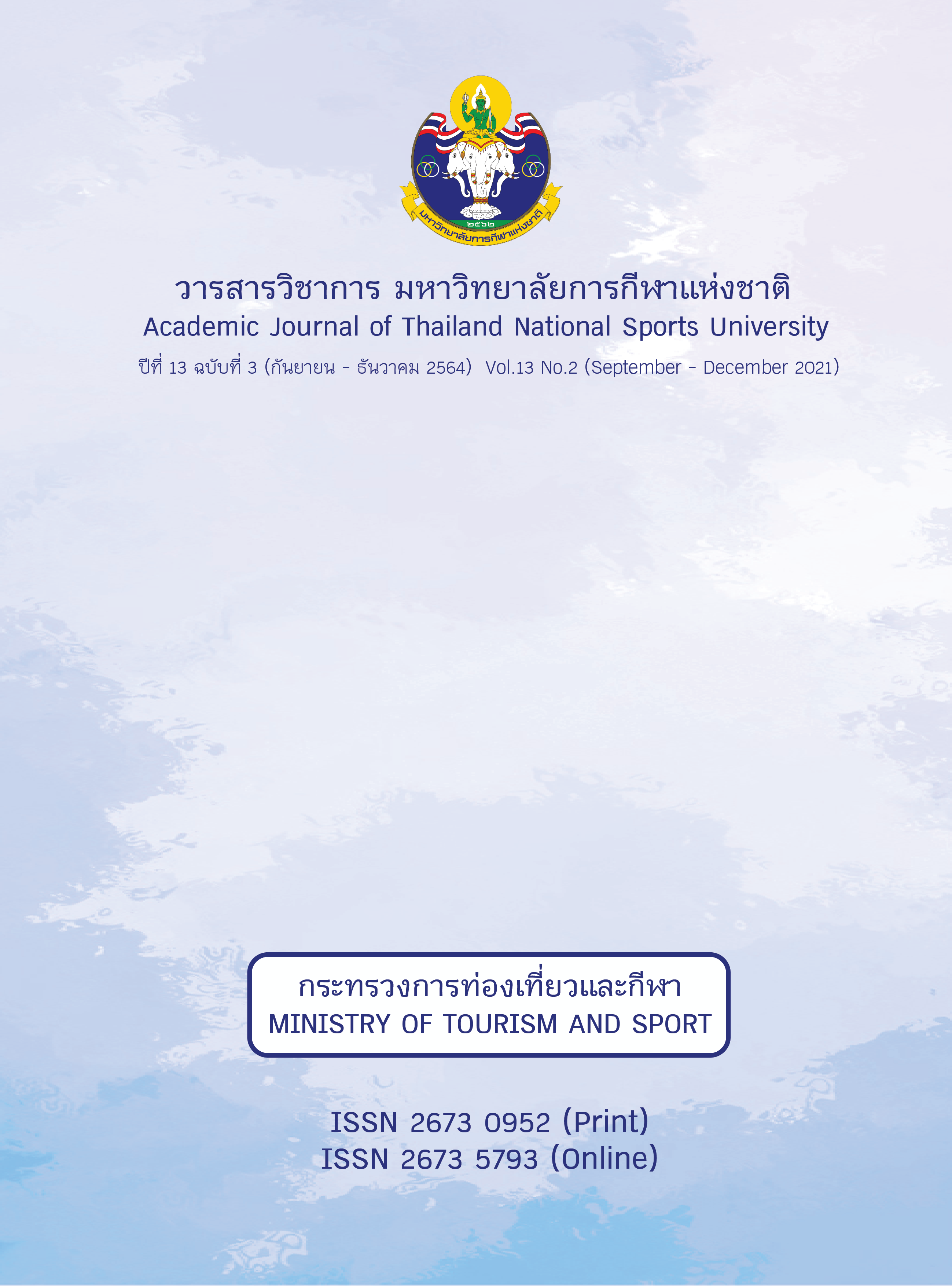INVESTIGATING THE INFLUENCE OF ACTN3 R577X POLYMORPHISM ON SPEED - POWER RELATED PARAMETERS USING MOTION CAPTURE TECHNOLOGY
Main Article Content
Abstract
ACTN3 gene has been labeled as the ‘gene of speed’ due to the increased frequency of the R allele in various cohorts of elite sprint athletes compared to the general population. The R allele of the gene encodes the sarcomeric protein α-actinin-3 almost exclusively restricted to fast, glycolytic, type 2X fibers which are responsible for producing ‘explosive’, powerful contractions. Elite athletes who expressed -actinin-3 protein (ACTN3 RR genotype) have demonstrated faster sprint times compared to those who do not express it (ACTN3 XX genotype). The present study aimed to provide an extensive biomechanical analysis to investigate the influence of ACTN3 gene on, Squat Jump (SJ), Counter Movement Jump (CMJ), Drop Jump (DJ), and 5 m sprints by comparing maximal performance, velocity and acceleration, in jumps and sprints between Thai individuals with different ACTN3 genotypes. Participants had a mean age of 24.2 years ± 3.86 years, a mean BMI of 23.53 ± 2.87 kg/m2 and a mean systolic blood pressure of 121 ± 12.20 mmHg. The biomechanical data were obtained using a QTM motion analysis system and the genetic analysis was conducted with MiniAmp™ Cycler. Our results showed no statistically significant differences between ACTN3 genotypes. DJ height performance for the participants with ACTN3 RR genotype was 0.38 ± 0.08 m compared to 0.37±0.06 m for their ACTN3 XX counterparts. Our preliminary findings indicated a considerable variability in velocity and acceleration between participants. More participants are required to allow us to investigate the potential underlying ACTN3 gene influence responsible for this variability.
Article Details
The published article is a copyright of the Academic Journal of Thailand National Sports University. The passage appeared in each article in this academic journal is a perspective of each author which is not related to the journal. Each author is required to be responsible for all components of his/her own article. If there are any mistakes, each author must be responsible for those mistakes on his/her own.
References
Broos, S., Van Leemputte, M., Deldicque, L., & Thomis, M. (2015). History-dependent force, angular velocity and muscular endurance in ACTN3 genotypes. Eur J Appl Physiol, 115(8), 1637 - 1643.
Beggs, A. H., Byers, T. J., Knoll, J., Boyce, F. M., Bruns, G., & Kunkel, L. (1992). Cloning and characterization of two human skeletal muscle alpha-actinin genes located on chromosomes 1 and 11. The American Society for Biochemistry and Molecular Biology, 67(13), 9281 - 9288.
Chatterjee, R., Chapman, T., Brannan, M. G., & Varney, J. (2017). GPs’ knowledge, use, and confidence in national physical activity and health guidelines and tools: A questionnaire-based survey of general practice in England. British Journal of General Practice, 67(663), e668-e675. doi: 10.3399/bjgp17X692513 %J
Garatachea, N., Verde, Z., Santos-Lozano, A., Yvert, T., Rodriguez-Romo, & G., Sarasa, F. J. (2014). ACTN3 R577X polymorphism and explosive leg-muscle power in elite basketball player. International Journal of Sports Physiology and Performance, 9(2), 226 - 232.
Klissouras, V. (1971). Heritability of adaptive variation. Journal of Applied Physiology, 1(3), 338 - 344.
Moran, C. N., Yang, N., Bailey, M. E., Tsiokanos, A., Jamurtas, A., & MacArthur, D. G. (2007). Association analysis of the ACTN3 R577X polymorphism and complex quantitative body composition and performance phenotypes in adolescent Greeks. European Journal of Human Genetics, 15(1), 88 - 93.
Niemi, A.-K., and Majamaa, K. (2005). Mitochondrial DNA and ACTN3 genotypes in Finnish elite endurance and sprint athletes. European Journal of Human Genetics, 13(8), 965 - 969.
North, K. N., Yang, N., Wattanasirichaigoon, D., Mills, M., Easteal, S., & Beggs, A. (1999). A common nonsense mutation results in α-actinin-3 deficiency in the general population. Nature Genetics, 1(4), 353 - 354.
Papadimitriou, I., Papadopoulos, C., Kouvatsi, A., & Triantaphyllidis, C. (2008). The ACTN3 gene in elite Greek track and field athletes. International Journal of Sport Medicine, 29(04), 352 - 355.
Papadimitriou, I. D., Lucia, A., Pitsiladis, Y. P., Pushkarev, V. P., Dyatlov, D. A., Orekhov, E. F., & Ginevičienė, V. J. B. (2016). ACTN3 R577X and ACE I/D gene variants influence performance in elite sprinters: A multi-cohort study. BMC Genomics, 17(1).
Papadopoulos, C., Sambanis, M., Gissis, I., Noussios, G., Gandiraga, E., Manolopoulos, E., & Papadimitriou, I. (2009). Evaluation of force and vertical jump performance in young swimmers with different force – time curve charachteristics. Biology of Sport, 26(4).
Peeters, M. W., Thomis, M. A., Maes, H. H., Loos, R. J., Claessens, A. L., Vlietinck, R., & Beunen, G. P. (2005). Genetic and environmental causes of tracking in explosive strength during adolescence. Behav Genet, 35(5), 551 - 563.
Ruiz, J. R., Fernández del Valle, M., Verde, Z., Díez - Vega, I., Santiago, C., Yvert, T. (2011). ACTN3 R577X polymorphism does not influence explosive leg muscle power in elite volleyball players. Scandinavian Journal of Medicine and Science in Sports, 21(6), e34 - e41.
Santiago, C., Rodríguez - Romo, G., Gómez - Gallego, F., González - Freire, M., Yvert, T., Verde, Z. (2010). Is there an association between ACTN3 R577X polymorphism and muscle power phenotypes in young, non - athletic adults. Scandinavian Journal of Medicine and Science in Sports, 20(5), 771 - 778.
Thomas, S., Reading, J., & Shephard, R. J. (1992). Revision of the physical activity readiness questionnaire (PAR - Q). Can J Sport Sci, 17(4), 338 - 345.
Yang, N., MacArthur, D. G., Gulbin, J. P., Hahn, A. G., Beggs, A. H., Easteal, S., & North K. (2003). ACTN3 genotype is associated with human elite athletic performance. American Journal of Human Genetics, 73(3), 627 - 631.


